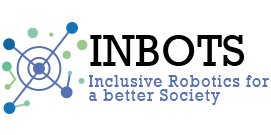.

Amparo Grau, Financial and Tax Law Professor at the UCM, explains that the INBOTS intermediate review has been positive regarding its results so far. In the coming year, the team dealing with the debate on ethical, legal and socio-economic issues is going to focus more efforts on the environmental impact of robotics and artificial intelligence, besides privacy. Professor Grau addresses the importance of improving the functional technological training of workers, as well as of trying to find innovative financial formulas to meet the challenge of the immediate transition. The flexibility of the tax systems and the social security systems have to be explored for companies to become sustainable when it comes to financing their workers training.
Create or Destroy Employment?
The INBOTS economical perspective is managed at the UCM by José Ignacio López Sánchez, Vice Chancellor for Economic Policy and Professor of Business Management, in collaboration with Professor Goos, Chair of the High-level experts group for the Future of Work in the European Union at the Utrecht University. Professor López Sánchez highlights the importance of training and skills as they relate to knowledge and the company’s ability to adapt in order to be competitive. He also states that technological revolution will not destroy employment, but rather create new employment, like any previous revolution, while generating international competition in the race to technological adaptation.
Tax System
Álvaro Falcón, researcher of the INBOTS project and PhD candidate at the UCM Department of Commercial, Financial and Tax Law, believes that it is true that new jobs will be created, although it is not yet known what they will be. The main difference between this period of change and any other is the speed at which the change is happening. It is necessary to be prepared to keep up with that speed and that we bet on not only young people filling these new roles, but also current active workers adapting to the reality of robotics. Nowadays, there is a great concern about the lack of resources, because there is insufficient revenue and social spending keeps increasing. It is not about creating a new tax on robots or machines, but adapting what already exists to what is being transformed.
Labor Relations
According to Yolanda Sánchez-Urán, Professor of Labour and Social Security Law at the UCM, human work will continue, although it will have different parameters, since the current technological revolution is much more disruptive than previous industrial revolutions. This is a reality that society is already facing within digital platforms, where technology breaks the traditional contexts seen in Labor Law and Social Security. Having a ‘standard’ job has already changed, because the parameters of space, time and workplace have been radically modified. National and international policy must change to help and accommodate the transition from old into new work parameters, as it has already happened in some high-robot-density countries such as Japan.

Gender
Professor López Sánchez informs us that the data gathered on job loss due to robotisation do not relate it to gender, but rather with the activity being carried out. The less qualified workers are, percentage-wise, men, so they will be more affected. In order to improve the companies’ competence, it is fundamental to focus on training. Professor Grau further explains that the goal should not be to buy the most expensive and advanced technology, but to be aware of the of the company’s objectives and find advice on the measures, within the different functionalities of artificial intelligence and robotics, that are truly needed.
Ethics
At an European level, it is being debated whether ethical criteria should be standardised by looking, as an example, for trustworthy artificial intelligence, in line with the proposals of the High Level Expert Group of the European Commission (of which an INBOTS member, Professor Coeckelbergh, University of Viena, was part). However, the standardisation of ethics is difficult. Researchers often face the dilemma of how far the hard, traditional law and the soft law, that is, self-regulation by companies through standards, should go. In searching for solutions we must try not to curb innovation at the same time as ensuring people’s rights, she adds.
When it comes to liability, researchers from the Scuola Superiore Sant’Anna of Pisa are analysing the field of insurance in light of the risks that robotics can entail. Researchers from the City University of London have focused on industrial and intellectual property, reaching the conclusion that some European rules need to be updated and thus working on proposals to do so.
All the information obtained through studies and activities within the INBOTS project about legal, ethical, economic, tax, labor, gender aspects will be reflected in the White Paper for the Regulation of Interactive Robotics, which will be delivered on 31 December this year.
.
Find the entire article in Spanish
.
.
